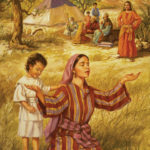The text for this lesson is Joshua 2.
Key Point
- No matter what sins we may have committed, God works through our repentance and faith to deliver us from destruction and eternal death.
- Law: God will punish all who fight against Him and refuse to fear and trust Him, as happened with the people of Jericho.
- Gospel: God’s mercy is even greater than His wrath, for He forgives and restores to life all who repent and fear Him, as happened with Rahab.
Discussion Points
- After leading Israel forty years in their wilderness wanderings, Moses died. He had appointed his assistant, Joshua, to lead the Israelites into Canaan to conquer and settle the land. Not only would this fulfill the Lord’s promise that the Israelites would receive this land as an inheritance, but it would also be an example that the Lord punishes evildoers. The Canaanites were idolaters whom the Lord devoted to destruction as a warning against those who fail to worship Him as God. Jericho was the first city of Canaan to be conquered because of its economic and tactical importance. It was a center of commerce, and it was also a central power in Canaan. By destroying Jericho, the Israelites would weaken the center of Canaanite resistance and also make space for their own military base, from which to carry out further operations against other Canaanite cities.
- The story of Rahab is a wonderful narrative of God’s grace for individuals of all nations, no matter their background or past. Rahab is a prostitute (Joshua 2:1). Yet her story is one of the wonderful conversion that God worked by grace in her. Rahab’s actions show her fear and trust in God. From an earthly perspective, the spies are at her mercy and have little to offer her. The city gates have been closed; with one word, Rahab could have handed over the spies and perhaps received some kind of reward. There is no earthly reason whyshe should think the Israelites would conquer Jericho. Jericho was a mighty fortress with superior military technology. Rather than turn the spies over to Jericho’s officials, Rahab hides them in her house at great personal risk.
- Then Rahab gives an account of the reason for her trustin God (2:8–11). The reports of God’s mighty works have reached all the way to Canaan. He parted the Red Sea to provide for the Israelites’ escape from Egypt, and He recently led the Israelites in conquest over Sihon and Og, two powerful Amorite kings east of the Jordan (Numbers 21). But Rahab sees these conquests not just as struggles between gods but as the victory of the true God. It is not as though the Lord is a god only of the Israelites and He happened to defeat the Egyptian gods and the Amorite gods on a good day. Rather, the Lord is “God in the heavens above and on the earth beneath” (Joshua 2:11). He is God over all the nations, even the Egyptians, Amorites, Israelites, and Canaanites. Rahab has come to believe this. She confesses her belief and asks for deliverance and salvation through this faith.
- The spies ask her to hang, as a sign of her faithful confession, a scarlet cord from her window to indicate to the invading army not to harm those in the house so marked. The red color of this cord also symbolizes the blood shed to cover all of God’s faithful. For it is not Rahab’s blood, nor the blood of the Israelites or of the people of Jericho, that purifies, but the shed blood of Jesus alone that cleanses all from sin. This blood of Jesus also marks everyone in Rahab’s household so they are forgiven and delivered from destruction..







